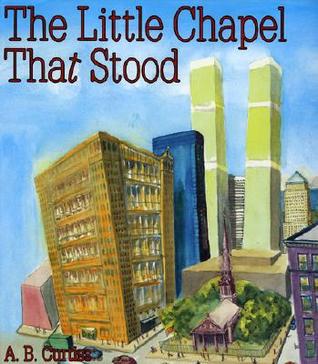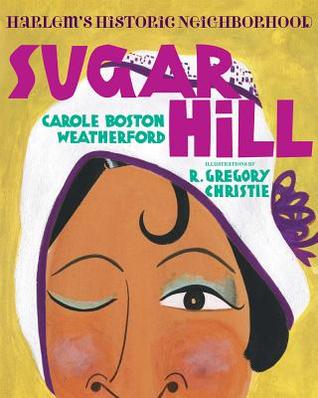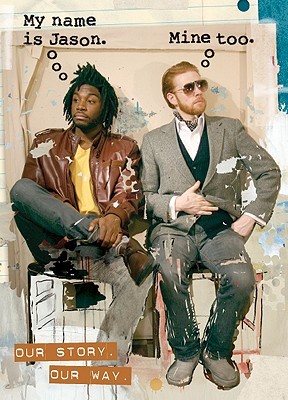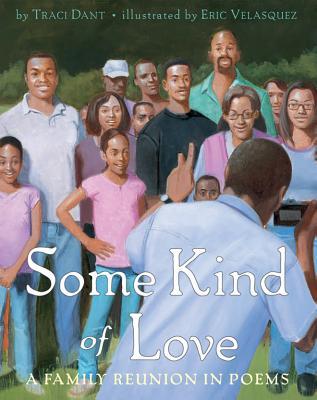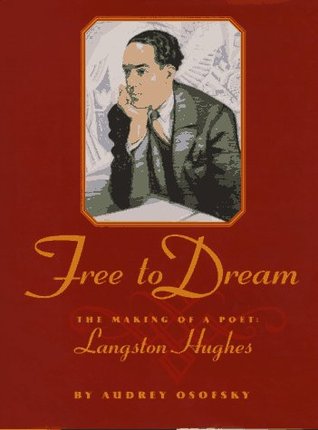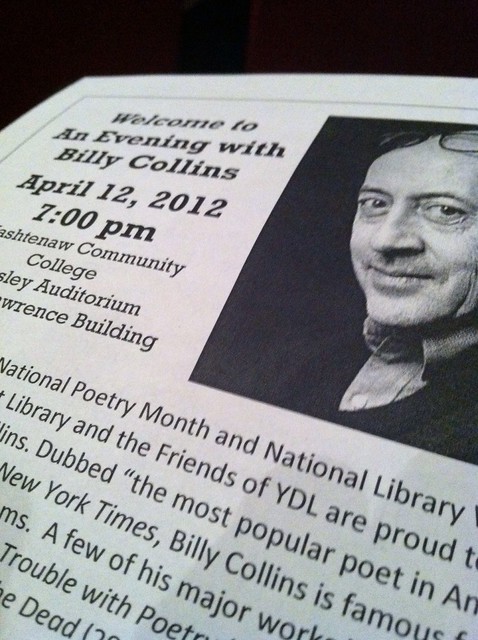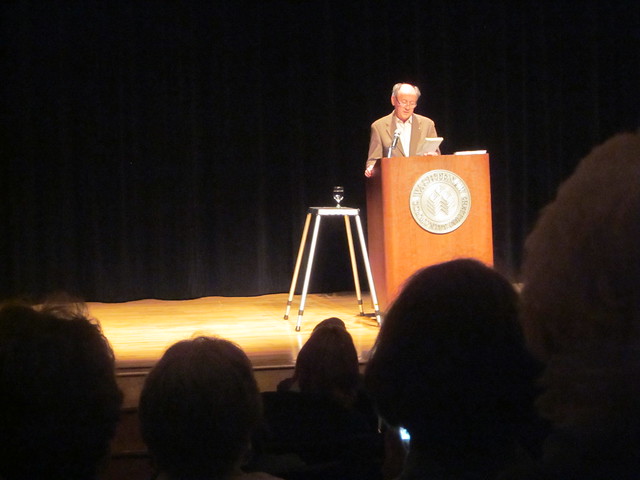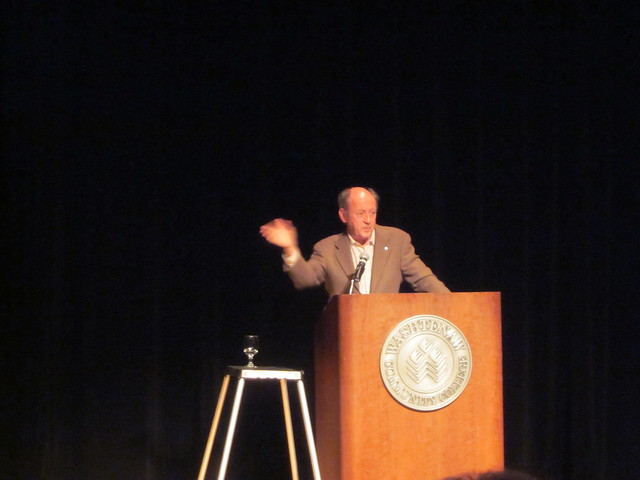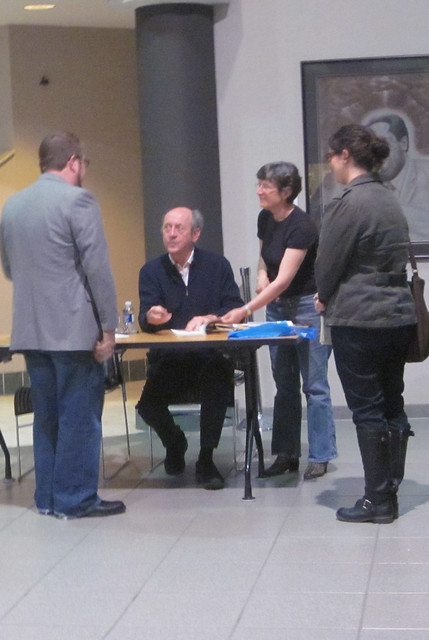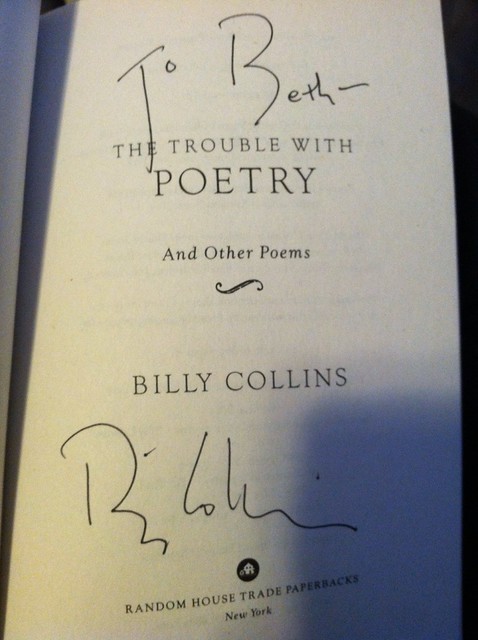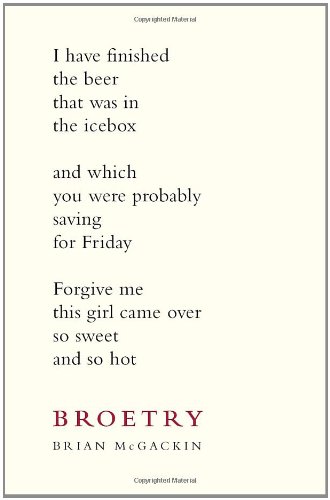Like so many English teachers, I first came to hear the name Sarah Kay from her Def Jam Poetry performance of "Hands." She has many more memorable performances that you can find on YouTube, but "Hands" is the one I keep coming back to again and again.
Having come to know of Sarah Kay through her powerful spoken word poems, I was elated to discover she now has a written and published collection of poetry in book form.
Even though I love poetry, I am usually a fast, fickle, and impatient
reader of poems. My method of reading poetry is
generally to scan the poem, and if I come to the last line and it has a
powerful, resonating cadence, then I'll go back and reread the entire
thing more slowly.
That was not my process with the poems in No Matter the Wreckage. I just wanted to slowly drink in every single word for every single poem.
No
Matter the Wreckage is one of the most unique collections of poetry I
have ever read. It's not a memoir in verse, but the poems are deeply
personal, following an organization and chronology that make it feel as
such.
Somebody better make this young lady Poet Laureate
someday because her words have a power and beauty like nothing I've ever
seen before. I hope we will be watching and viewing her poems for years to come.
No Matter the Wreckage by Sarah Kay
Published: March 18, 2014
Publisher: Write Bloody Publishing
Pages: 143
Genre: Poetry
Audience: Adult/Young Adult
Disclosure: Purchased copy
If you buy this book or any book
through Amazon, it is my hope that you also regularly patronize
independent bookstores, which are important centerpieces of thriving
communities. While I am an Amazon Affiliate, that by no means implies
that I only buy my books through their website. Please make sure you are
still helping small, independent bookstores thrive in your community.
To locate an independent bookstore near you, visit IndieBound.
Showing posts with label poetry. Show all posts
Showing posts with label poetry. Show all posts
Tuesday, May 5, 2015
Tuesday, January 13, 2015
The Little Chapel That Stood by A.B. Curtiss, illustrated by Mirto Golino
Around the Chapel
of Old St. Paul
Blow the dancing leaves
of the coming Fall.
In the morning breeze
they leap and fly
Beneath the towers
that scrape the sky.
The Little Chapel That Stood is an illustrated poem about St. Paul's Chapel in lower Manhattan, which was built in 1766 and is less than 100 yards from where the Twin Towers once stood. Miraculously, on that fateful day in September of 2001, St. Paul's was left unscathed. Even the fragile chandeliers that had once been packed away during two world wars never wavered. The firemen who valiantly risked their lives to rush into the World Trade Center in an attempt to save lives, hastily left their shoes on the iron fence as they laced up their boots and went to work.
After the events of 9-11, St. Paul's became a meeting place, a place of solace, a place of hope, and a place to grieve those who lost their lives. This beautiful, moving poem is a tribute to unwavering strength, faith and the search for a symbol of hope in a time of such tragedy.
The Little Chapel That Stood, while written shortly after September 11, 2001, stands the test of time and is a text that will undoubtedly be read and studied now that we are viewing 9-11 more as a moment in history rather than as part of the raw wounds of the present.
The Little Chapel That Stood by A.B. Curtiss, illustrated by Mirto Golino
Published: July 1, 2003
Publisher: OldCastle Publishing
Pages: 40
Genre: Picture Book/Poetry
Audience: Primary/Middle Grade/Young Adult
Disclosure: Library Copy
If you buy this book or any book through Amazon, it is my hope that you also regularly patronize independent bookstores, which are important centerpieces of thriving communities. While I am an Amazon Affiliate, that by no means implies that I only buy my books through their website. Please make sure you are still helping small, independent bookstores thrive in your community. To locate an independent bookstore near you, visit IndieBound.
of Old St. Paul
Blow the dancing leaves
of the coming Fall.
In the morning breeze
they leap and fly
Beneath the towers
that scrape the sky.
The Little Chapel That Stood is an illustrated poem about St. Paul's Chapel in lower Manhattan, which was built in 1766 and is less than 100 yards from where the Twin Towers once stood. Miraculously, on that fateful day in September of 2001, St. Paul's was left unscathed. Even the fragile chandeliers that had once been packed away during two world wars never wavered. The firemen who valiantly risked their lives to rush into the World Trade Center in an attempt to save lives, hastily left their shoes on the iron fence as they laced up their boots and went to work.
After the events of 9-11, St. Paul's became a meeting place, a place of solace, a place of hope, and a place to grieve those who lost their lives. This beautiful, moving poem is a tribute to unwavering strength, faith and the search for a symbol of hope in a time of such tragedy.
It's nice to be big
and it's nice
to be tall.
But, sometimes,
being little
Doesn't mean
being small.
The Little Chapel That Stood, while written shortly after September 11, 2001, stands the test of time and is a text that will undoubtedly be read and studied now that we are viewing 9-11 more as a moment in history rather than as part of the raw wounds of the present.
The Little Chapel That Stood by A.B. Curtiss, illustrated by Mirto Golino
Published: July 1, 2003
Publisher: OldCastle Publishing
Pages: 40
Genre: Picture Book/Poetry
Audience: Primary/Middle Grade/Young Adult
Disclosure: Library Copy
If you buy this book or any book through Amazon, it is my hope that you also regularly patronize independent bookstores, which are important centerpieces of thriving communities. While I am an Amazon Affiliate, that by no means implies that I only buy my books through their website. Please make sure you are still helping small, independent bookstores thrive in your community. To locate an independent bookstore near you, visit IndieBound.
Tuesday, December 9, 2014
Sugar Hill: Harlem's Historic Neighborhood by Carole Boston Weatherford, illustrated by R. Gregory Christie
Sugar Hill, Sugar Hill where life's so sweet
that pride rings out on every street.
Sugar Hill is the well-known neighborhood in Harlem that came to prominence in the 1920s and 1930s during the Harlem Renaissance. Written in bouncy rhyming verse, this vibrantly illustrated tribute to the artists, writers, and celebrities that resided there is a beautiful historical and cultural title to include in your library - whether it's a school, classroom, or home library.
The author's note at the end provides readers with further background information about Sugar Hill as well as well as the famous names peppered throughout the story, such as Duke Ellington, Miles Davis, and Zora Neale Hurston.
Sugar Hill: Harlem's Historic Neighborhood by Carole Boston Weatherford, illustrated by R. Gregory Christie
Published: February 1, 2014
Publisher: Albert Whitman & Company
Pages: 32
Genre: Nonfiction Picture Book
Audience: Middle Grade
Disclosure: Library Copy
If you buy this book or any book through Amazon, it is my hope that you also regularly patronize independent bookstores, which are important centerpieces of thriving communities. While I am an Amazon Affiliate, that by no means implies that I only buy my books through their website. Please make sure you are still helping small, independent bookstores thrive in your community. To locate an independent bookstore near you, visit IndieBound.
that pride rings out on every street.
Sugar Hill is the well-known neighborhood in Harlem that came to prominence in the 1920s and 1930s during the Harlem Renaissance. Written in bouncy rhyming verse, this vibrantly illustrated tribute to the artists, writers, and celebrities that resided there is a beautiful historical and cultural title to include in your library - whether it's a school, classroom, or home library.
The author's note at the end provides readers with further background information about Sugar Hill as well as well as the famous names peppered throughout the story, such as Duke Ellington, Miles Davis, and Zora Neale Hurston.
Sugar Hill: Harlem's Historic Neighborhood by Carole Boston Weatherford, illustrated by R. Gregory Christie
Published: February 1, 2014
Publisher: Albert Whitman & Company
Pages: 32
Genre: Nonfiction Picture Book
Audience: Middle Grade
Disclosure: Library Copy
If you buy this book or any book through Amazon, it is my hope that you also regularly patronize independent bookstores, which are important centerpieces of thriving communities. While I am an Amazon Affiliate, that by no means implies that I only buy my books through their website. Please make sure you are still helping small, independent bookstores thrive in your community. To locate an independent bookstore near you, visit IndieBound.
Sunday, May 4, 2014
My Name is Jason. Mine Too. Our Story. Our Way. by Jason Reynolds & Jason Griffin
A book of poetry and art
created by two friends,
one black
the other white,
one an artist
the other a poet.
Bound together
by their brotherhood of friendship,
frequent nights of cereal for dinner,
struggles to make rent,
and big dreams.
I recently attended a book event at Literati Bookstore and had the privilege of listening to Jason Reynolds speak. He is currently on tour promoting his new novel When I Was the Greatest and if his reading a snippet of that novel weren't enough to convince me that I need to read that book RIGHT NOW, I also discovered this little-known gem after I went home and researched some of his previous work. What a wonderful premise for a book!
My Name is Jason has an almost multi-genre feel to it even though it is mostly a book of poetry. Jason Griffin's art is raw and confessional and Reynolds's writing has an equally confessional style, which is further evidenced by some poems that are handwritten and even have words crossed out in
places, adding to its rawness. This is like no book I've
ever read before and in my opinion should be on the shelf of every high school and college library
in America. It celebrates friendship and diversity, examines the price you pay for choosing a less-than-stable career path, encourages you to follow your dreams, and does all these things without being cliché. I have a feeling a great many teenagers and young adults would identify with this book. It's a shame this book wasn't marketed more, which is further proof that the #WeNeedDiverseBooks twitter campaign that was trending this week is very much needed. Publishers please, I'm begging you: start embracing and marketing books like this. It's time you understood that people WANT to see diversity in the books they buy because, as you can see from the following picture, we want to nurture more friendships like Jason and Jason. This beautiful picture is one of many that I recently saw on a BuzzFeed post called 18 Adorable Reasons We Need Diverse Books.
My Name is Jason. Mine Too. Our Story. Our Way. by Jason Reynolds and Jason Griffin
Published: April 21, 2009
Publisher: Harper Teen
Pages: 96
Genre: Poetry
Audience: Young Adult
Disclosure: Library Copy
created by two friends,
one black
the other white,
one an artist
the other a poet.
Bound together
by their brotherhood of friendship,
frequent nights of cereal for dinner,
struggles to make rent,
and big dreams.
I recently attended a book event at Literati Bookstore and had the privilege of listening to Jason Reynolds speak. He is currently on tour promoting his new novel When I Was the Greatest and if his reading a snippet of that novel weren't enough to convince me that I need to read that book RIGHT NOW, I also discovered this little-known gem after I went home and researched some of his previous work. What a wonderful premise for a book!
My Name is Jason has an almost multi-genre feel to it even though it is mostly a book of poetry. Jason Griffin's art is raw and confessional and Reynolds's writing has an equally confessional style, which is further evidenced by some poems that are handwritten and even have words crossed out in
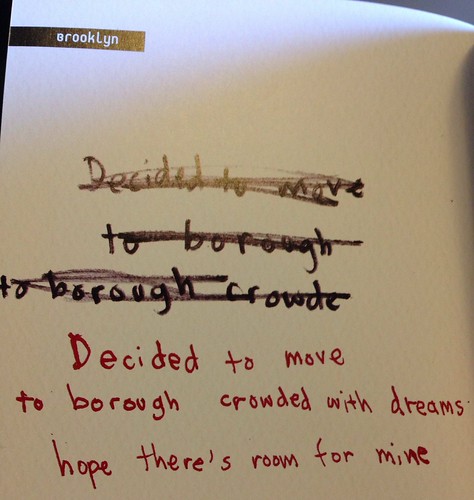 |
| One of many confessional moments |
My Name is Jason. Mine Too. Our Story. Our Way. by Jason Reynolds and Jason Griffin
Published: April 21, 2009
Publisher: Harper Teen
Pages: 96
Genre: Poetry
Audience: Young Adult
Disclosure: Library Copy
Tuesday, November 19, 2013
Picture book review: Knock Knock by Daniel Beaty, illustrated by Bryan Collier
A few years ago I was looking for some spoken word poetry performances on YouTube in the hopes of motivating my students to put passion and expression in their own poetry performances. Every April I had my 6th graders memorize and recite a poem of their choosing. It was then that I came across the young Daniel Beaty's Def Poetry performance of "Knock Knock"
I was so moved by this performance that I just knew I had to show it to my students. I imagine if Langston Hughes lived in the 21st century, he'd sound a lot like Daniel Beaty. Out of all the spoken word poems I have shown my students, this one garners the most discussion and curiosity.
Some students ask, "Wait, so what happened to his dad?"
Others confidently respond, "He went to prison."
I push their thinking further by asking, "What does Beaty say in the poem to leads you to believe his dad is in prison?"
And soon students are asking me to show the performance again so they can pick up on the details they missed the first time. Last year my students were so moved by this performance that many of them felt genuine compassion for Beaty and wanted to know more of his story.
So when I discovered that Beaty had turned his spoken word poem into a picture book I was elated. And knowing the story of the poem, I was already deeply affected by the book just by the cover alone. Bryan Collier's illustrations add an extra layer of emotion to Beaty's words. I will say that as much as I loved this picture book rendering, Beaty's spoken word performance is still more powerful in my mind. Because of his need to tweak some of the point of view to make it more appropriate for a picture book telling, some of the impact of his original message is diminished. But for younger kids, it is still a powerful story. I will be absolutely shocked if this book doesn't receive a Coretta Scott King nod in January. The only reason it might not is because it will be published so late in the year (December 17th). But even still, you can't deny what a worthy award-winner it would (and should) make.
Knock Knock: My Dad's Dream for Me by Daniel Beaty, illustrated by Bryan Collier
Expected Publication: December 17, 2013
Publisher: Little, Brown Books for Young Readers
Pages: 40
Genre: Picture Book
Audience: Primary/Middle Grade/Young Adult
Disclosure: Copy acquired from publisher
I was so moved by this performance that I just knew I had to show it to my students. I imagine if Langston Hughes lived in the 21st century, he'd sound a lot like Daniel Beaty. Out of all the spoken word poems I have shown my students, this one garners the most discussion and curiosity.
Some students ask, "Wait, so what happened to his dad?"
Others confidently respond, "He went to prison."
I push their thinking further by asking, "What does Beaty say in the poem to leads you to believe his dad is in prison?"
And soon students are asking me to show the performance again so they can pick up on the details they missed the first time. Last year my students were so moved by this performance that many of them felt genuine compassion for Beaty and wanted to know more of his story.
So when I discovered that Beaty had turned his spoken word poem into a picture book I was elated. And knowing the story of the poem, I was already deeply affected by the book just by the cover alone. Bryan Collier's illustrations add an extra layer of emotion to Beaty's words. I will say that as much as I loved this picture book rendering, Beaty's spoken word performance is still more powerful in my mind. Because of his need to tweak some of the point of view to make it more appropriate for a picture book telling, some of the impact of his original message is diminished. But for younger kids, it is still a powerful story. I will be absolutely shocked if this book doesn't receive a Coretta Scott King nod in January. The only reason it might not is because it will be published so late in the year (December 17th). But even still, you can't deny what a worthy award-winner it would (and should) make.
Knock Knock: My Dad's Dream for Me by Daniel Beaty, illustrated by Bryan Collier
Expected Publication: December 17, 2013
Publisher: Little, Brown Books for Young Readers
Pages: 40
Genre: Picture Book
Audience: Primary/Middle Grade/Young Adult
Disclosure: Copy acquired from publisher
Thursday, May 2, 2013
This is Just to Say
The famous William Carlos Williams poem "This is Just to Say" was
used as the inspiration for an entire book by Gail Carson Levine called
Forgive Me, I Meant to Do It: False Apology Poems. What is so brilliant
about this book is that it inspires students and adults alike to write their own false
apology poems.
Here is the original poem by William Carlos Williams:
This is Just to Say
I have eaten
the plums
that were in
the icebox
and which
you were probably
saving
for breakfast
Forgive me
they were delicious
so sweet
and so cold
During poetry month, my students wrote their own false apology poems. Here are some examples:
This is Just to Say
I have eaten
the red poisonous
berries
In which you were
going to trick
the Capitol with.
Forgive me
They were so good
And I was so hungr---
Stevie M.
This is Just to Say
I have used
my lightsaber
to chop off your arm.
Because you
went and
blew up my
Death Star.
Forgive me
but I am
your
father.
Noah M.
This is just to say
that I have ruined
your homemade pot roast
You were probably
saving it
for our dinner.
Forgive me
but I don't
want to get food poisoning
Isabelle A.
And I had to share this one with the illustration since it relates to one of my students' favorite picture books this year, This is Not My Hat by Jon Klassen. I love the idea of students being inspired by multiple pieces of literature.

Maria H.
What would your false apology be?
Here is the original poem by William Carlos Williams:
This is Just to Say
I have eaten
the plums
that were in
the icebox
and which
you were probably
saving
for breakfast
Forgive me
they were delicious
so sweet
and so cold
During poetry month, my students wrote their own false apology poems. Here are some examples:
This is Just to Say
I have eaten
the red poisonous
berries
In which you were
going to trick
the Capitol with.
Forgive me
They were so good
And I was so hungr---
Stevie M.
This is Just to Say
I have used
my lightsaber
to chop off your arm.
Because you
went and
blew up my
Death Star.
Forgive me
but I am
your
father.
Noah M.
This is just to say
that I have ruined
your homemade pot roast
You were probably
saving it
for our dinner.
Forgive me
but I don't
want to get food poisoning
Isabelle A.
And I had to share this one with the illustration since it relates to one of my students' favorite picture books this year, This is Not My Hat by Jon Klassen. I love the idea of students being inspired by multiple pieces of literature.

Maria H.
What would your false apology be?
Sunday, April 14, 2013
Some Kind of Love: A Family Reuinion in Poems by Traci Dant, illustrated by Eric Velasquez
Traci Dant's collection of poems all revolve around one family reunion
and the joy that pours forth from such an encounter. Every poem in this
book begins with "Must be some kind of love" and runs the gamut of
topics from where everyone sleeps at grandma's house, to fishing, to cousins eating fried
chicken together.
The wheels are already turning for using this book with students to write their own family poems that begin with "Must be some kind of love." So many great details in these poems to share and emulate.
One of my favorites from the book:
Family Photograph
Must be some kind of love
'cause daddy says, We don't
ever want to forget any member
of our loud-laughing,
hat-wearing, pearl-necked, knee-
stockinged, shoe-shined family.
So we all stand on the green shore
of Grandma's lawn and smile wide
when the photographer says, Cheese.
Some Kind of Love: A Family Reunion in Poems by Traci Dant, illustrated by Eric Velasquez
Published: April 1, 2010
Publisher: Marshall Cavendish Children's Books
Pages: 32
Genre: Poetry/Picture Book
Audience: Middle Grade/Primary
Disclosure: Library Copy
The wheels are already turning for using this book with students to write their own family poems that begin with "Must be some kind of love." So many great details in these poems to share and emulate.
One of my favorites from the book:
Family Photograph
Must be some kind of love
'cause daddy says, We don't
ever want to forget any member
of our loud-laughing,
hat-wearing, pearl-necked, knee-
stockinged, shoe-shined family.
So we all stand on the green shore
of Grandma's lawn and smile wide
when the photographer says, Cheese.
Some Kind of Love: A Family Reunion in Poems by Traci Dant, illustrated by Eric Velasquez
Published: April 1, 2010
Publisher: Marshall Cavendish Children's Books
Pages: 32
Genre: Poetry/Picture Book
Audience: Middle Grade/Primary
Disclosure: Library Copy
Friday, February 22, 2013
A poem to start a conversation about bullying and self-worth by Shane Koyczan
You want to start having some conversations with your students about bullying? Show them this incredibly emotionally raw spoken word poem by Shane Koyczan, watch the tears fall, tell your students it's okay to cry, and then ask them to respond to it in writing.
Recommended for grades 7 and up.
Sunday, February 17, 2013
Reading about Langston Hughes leads me to thoughts about what Common Core means for our students
I'm sitting here in my home office on this lazy Sunday afternoon (lazy only because it's midwinter break and I don't have to go to work tomorrow) reading Free to Dream: The Making of a Poet, a biography of Langston Hughes (my favorite poet of all time), and I am struck by his educational background. While Hughes did very well in primary school and high school and was praised by his teachers for his love of learning, Hughes, one of our most celebrated American poets, was a college dropout. His first attempt at college was a failure. He went to Columbia University on his father's dime, and after one year decided that he preferred to read books and attend lectures instead of go to class.
I'm struck by this new piece of information I learned about Hughes today because, by all intents and purposes, he should have been a model student: he loved learning, did well all throughout his K-12 education, and was often recognized for his writing prowess by his teachers and classmates. If that's not a formula for someone who should succeed in college, then I don't know what is.
But that's just it. Education can't be whittled down to a formula - numbers to crunch, multiple choice questions to answer. By today's educational reformers, Hughes would be considered a failure. Politicians would deem him a product of a failed system and no doubt his teachers would be blamed (and perhaps fired) for his inability to understand physics and trigonometry, which were the classes he chose to skip and ultimately drop out of Columbia.
But in the 1920s, Hughes used his passion for writing and poetry to seek out like-minded, accomplished people who took him under their wing and nurtured his passion and talent, which we now know turned him into one of the most beloved writers in all of American history. I continue to wonder how people responsible for making decisions about education today can be so narrow minded and refuse to see past the numbers and into the minds and hearts of our students. While we're busy trying to "race to the top", students' needs and talents are disregarded. (Does anyone else see the irony in the fact that Arne Duncan has deemed "No Child Left Behind" a failure yet, with a name like "Race to the Top", the initiative which he created to replace NCLB, isn't the very nature of a race to leave people behind?)
So as the Common Core State Standards are asking me to make my students "college and career ready" and turn them into good little test-takers, I can't help but know in my heart that there are much more important things we should be focusing on, like nurturing passions and talents, showing students we care about them as people, and teaching them the importance of lifelong learning for their future instead of the desire for all A's on their report card and good standardized test scores. Despite the fact that CCSS architect David Coleman infamously told an audience of educators in 2011, "As you grow up in this world, you realize people really don't give a $#!% about what you feel or what you think," I'm going to nurture the Langston Hugheses in my classroom and make sure they know that they have a voice in this world and that I do give a $#!% what they feel and what they think. If I didn't give a $#!%, then well, I wouldn't (and shouldn't) be a teacher. And for all the David Colemans out there, well, it scares me that you are making decisions on behalf of my students and the Langston Hugheses of this world.
*~*~*~*~*~*
I've been scarred and battered.
My hopes the wind done scattered.
Snow has friz me, sun has baked me.
Looks like between 'em
They done tried to make me
Stop laughin', stop lovin', stop livin' --
But I don't care!
I'm still here!
from "Still Here" by Langston Hughes
I'm struck by this new piece of information I learned about Hughes today because, by all intents and purposes, he should have been a model student: he loved learning, did well all throughout his K-12 education, and was often recognized for his writing prowess by his teachers and classmates. If that's not a formula for someone who should succeed in college, then I don't know what is.
But that's just it. Education can't be whittled down to a formula - numbers to crunch, multiple choice questions to answer. By today's educational reformers, Hughes would be considered a failure. Politicians would deem him a product of a failed system and no doubt his teachers would be blamed (and perhaps fired) for his inability to understand physics and trigonometry, which were the classes he chose to skip and ultimately drop out of Columbia.
But in the 1920s, Hughes used his passion for writing and poetry to seek out like-minded, accomplished people who took him under their wing and nurtured his passion and talent, which we now know turned him into one of the most beloved writers in all of American history. I continue to wonder how people responsible for making decisions about education today can be so narrow minded and refuse to see past the numbers and into the minds and hearts of our students. While we're busy trying to "race to the top", students' needs and talents are disregarded. (Does anyone else see the irony in the fact that Arne Duncan has deemed "No Child Left Behind" a failure yet, with a name like "Race to the Top", the initiative which he created to replace NCLB, isn't the very nature of a race to leave people behind?)
 | |
| Langston Hughes: a CCSS poster boy he is not (photo: Poetry Foundation) |
*~*~*~*~*~*
I've been scarred and battered.
My hopes the wind done scattered.
Snow has friz me, sun has baked me.
Looks like between 'em
They done tried to make me
Stop laughin', stop lovin', stop livin' --
But I don't care!
I'm still here!
from "Still Here" by Langston Hughes
Saturday, April 21, 2012
Forgive Me, I Meant to Do It: False Apology Poems by Gail Carson Levine
This is Just to Say
I have eaten
the plums
that were in
the icebox
and which
you were probably
saving
for breakfast
Forgive me
they were delicious
so sweet and
so cold
- William Carlos Williams
And thus begins the inspiration for Gail Carson Levine's first book of poetry: with William Carlos Williams' infamous insincere apology. This is the first book I have ever encountered where one poem is used over and over again for inspiration and parody.
This is one of those books that isn't likely to lure in kids with its cover wiles or enchanting premise, but it's certainly a goldmine for teachers. What could be more perfect than to have kids write their own false apology poems? And that's exactly what my 6th graders did. After listening to a few of Levine's examples, which included apologies from Pinocchio, Peter Pan, Snow White, and the cow from Jack and the Beanstalk (a great way to teach allusion too), I got everyone thinking about what sorts of false apologies they could write.
The poems themselves, if you read them silently and alone, are not particularly provocative, and after reading about five of them, they get sort of tiresome, but in the context of the classroom, where students are sharing ideas, it can be a fun writing exercise and a means to an end, which is to get them to write their own poetry. Starting with a model to emulate is always the best way to go before getting students to write on their own. So not only did we have the original poem and the poems from this book as inspiration, but I also gave my students my own example:
This is Just to Say
I have eaten
the bacon
that was on the counter
and which
you were probably
saving
for ice cream
Forgive me
but
bacon is
meat candy
I was even impressed by the conversation that they initiated about point of view. In that, they asked, "So is this poem written from your husband's point of view?" A few of them argued that no, it was from my dog's, but regardless of whose point of view its from (either one is a logical choice, but I really wrote it with my husband in mind), it just shows that when you have faith in students to rise to the occasion, often they will go above and beyond. I only expected them to emulate a poetic form. Instead, we also had a discussion about point of view, something they have learned and applied in literature class this year (and not from a multiple choice test!) - and now English class too.
After our discussion, I left them to their own devices to have fun and come up with some creative ideas. Here are some of my own students' attempts:
This is Just to Say
I have broken
your vase
playing baseball
in the house
it must have cost you
a fortune
and you liked it
a lot
Forgive me
it was a good game
I earned 10 points
-Annie M.
This is Just to Say
I have given
my algebra work
to my dog
You probably
expected me to turn
it in today
Forgive me
I didn't like my
homework but my
dog did
-Micaela F.
This is Just to Say
I have stolen
your lucky rock
that was sitting
so innocently on the counter
that you probably
needed for
a math
test
Forgive me
I needed the luck
when you found out
I stole it
- Annabel R.
This is Just to Say
I will not
be home
on time
today
I was too
busy running from
zombies
I am sorry I didn't
want to get
infected
- Evan W.
Forgive Me, I Meant to Do It: False Apology Poems by Gail Carson Levine, illustrated by Matthew Cordell
Published: March 13, 2012
Publisher: Harper Collins
Pages: 80
Genre: Poetry
Audience: Middle Grade
Disclosure: This was a purchased copy - gotta have it for my classroom! :)
Friday, April 13, 2012
An evening with Billy Collins
In honor of National Poetry Month, a nearby library invited poet laureate Billy Collins to come and speak at the local community college. It completely astounded me that, in what I am sure is the busiest month of the year for Mr. Collins, he came and spoke at a community college. I would imagine a large university like the University of Michigan or Michigan State would invite and host such an esteemed literary icon. To me he is the Robert Frost of our generation. You don't get more esteemed than that when it comes to poetry.
Ever since I read my very first Billy Collins poem, "Introduction to Poetry", I have always had an affection for his poems. He writes in such an accessible way that even the most dubious of poetry readers can't help but find something to like about his style of writing. He has a perfect verbal cadence and always knows how to end his poems on the perfect note. Hearing him read his own poems last night in that perfect cadence just underscored what an amazing gift he truly has.
Collins approaches his poems with such lighthearted humor, and yet, they still manage to somehow be incredibly profound. Last night his poetry readings were received with much laughter dotted with an occasional contented sigh or thoughtful "Hmmm..." as the audience contemplated the poem's profundity.
During the Q & A portion of the evening, someone asked Collins what he thought made his poems so accessible to people, and I thought his response was really profound. He said (and I'm paraphrasing here) that you have to begin the poem in Kansas where the reader is. If you start it in Oz, where you (the writer) are, then you've already lost them.
So his secret to accessibility is always getting the reader up to speed before moving on to the deep stuff. A perfect example of this is a poem Collins read last night. It immediately lets the reader in the writer's mind with a simple title: "Hangover". Without that single word, the poem loses a great deal of its meaning, for the reader anyway. As you read the poem (or listen as was the case last night), you suddenly feel like you're in on the joke because you know exactly what this poem's about.
After his talk, Collins did a book signing and I was able to get two of his books signed. One that is an anthology of his own poems, The Trouble with Poetry, and the other is an anthology that he compiled called Poetry 180: A Turning Back to Poetry. As soon as he saw me with Poetry 180 he immediately asked, "Are you a teacher?" I guess owning that book is a sure sign someone is an English teacher. :)
Overall, it was an amazing evening of poetry and I feel that much more worldly and literary to say, "Why yes, one evening during National Poetry Month I went to see poet laureate Billy Collins speak and recite poetry. You do know that he's this generation's Robert Frost, right? Oh yeah, and he signed these books for me."
Ever since I read my very first Billy Collins poem, "Introduction to Poetry", I have always had an affection for his poems. He writes in such an accessible way that even the most dubious of poetry readers can't help but find something to like about his style of writing. He has a perfect verbal cadence and always knows how to end his poems on the perfect note. Hearing him read his own poems last night in that perfect cadence just underscored what an amazing gift he truly has.
Collins approaches his poems with such lighthearted humor, and yet, they still manage to somehow be incredibly profound. Last night his poetry readings were received with much laughter dotted with an occasional contented sigh or thoughtful "Hmmm..." as the audience contemplated the poem's profundity.
During the Q & A portion of the evening, someone asked Collins what he thought made his poems so accessible to people, and I thought his response was really profound. He said (and I'm paraphrasing here) that you have to begin the poem in Kansas where the reader is. If you start it in Oz, where you (the writer) are, then you've already lost them.
So his secret to accessibility is always getting the reader up to speed before moving on to the deep stuff. A perfect example of this is a poem Collins read last night. It immediately lets the reader in the writer's mind with a simple title: "Hangover". Without that single word, the poem loses a great deal of its meaning, for the reader anyway. As you read the poem (or listen as was the case last night), you suddenly feel like you're in on the joke because you know exactly what this poem's about.
After his talk, Collins did a book signing and I was able to get two of his books signed. One that is an anthology of his own poems, The Trouble with Poetry, and the other is an anthology that he compiled called Poetry 180: A Turning Back to Poetry. As soon as he saw me with Poetry 180 he immediately asked, "Are you a teacher?" I guess owning that book is a sure sign someone is an English teacher. :)
Overall, it was an amazing evening of poetry and I feel that much more worldly and literary to say, "Why yes, one evening during National Poetry Month I went to see poet laureate Billy Collins speak and recite poetry. You do know that he's this generation's Robert Frost, right? Oh yeah, and he signed these books for me."
Sunday, February 5, 2012
Langston's Train Ride by Robert Burleigh, illustrated by Leonard Jenkins
"I'm
madly scribbling words down now, rapidly one after another. (Poems are
like rainbows, don't you think? They escape if you're not quick!)"
In celebration of Black History Month, I am attempting to read more black authors and books about important African Americans. This picture book is the story of Langston Hughes' train ride to visit his father in 1920 where he was inspired to write one of his most famous poems The Negro Speaks of Rivers. It is also the moment he began to believe in himself as a writer.
Imaginative and striking, Leonard Jenkins' illustrations transport you through young Langston's journey with his bold strokes and haunting facial expressions. It's as if Hughes is boring into your soul with his determined gaze.
Equally as stunning is Robert Burleigh's ability to bring the reader inside Langston's emotions as he discovers his inspiration for this iconic work of American literature.
Langston Hughes is probably my favorite poet of all time. When I took African American literature in college, I remember Hughes' writing being the most vivid and empathetic of the writers we studied. As a white woman of middle class privilege, I can't claim to understand the plight of African Americans in our country. Hughes helped me to view this plight with empathy, compassion, and greater understanding. His writing makes you feel a solidarity with our African American brethren and ignites a desire for deference and contrition.
This picture book stirs up those same emotions in me as Hughes' poems themselves. As Tom Stoppard once said about words: "If you get the right ones in the right order, you can nudge the world a little." Writers like Langston Hughes were able to do that with their words and books like this that pay such reverent homage to one such man should be commended and celebrated.
Langston's Train Ride by Robert Burleigh, illustrated by Leonard Jenkins
Published: October 2004
Publisher: Scholastic
Pages: 32
Genre: Non-fiction/Poetry/Picture Book
Audience: Middle Grade
In celebration of Black History Month, I am attempting to read more black authors and books about important African Americans. This picture book is the story of Langston Hughes' train ride to visit his father in 1920 where he was inspired to write one of his most famous poems The Negro Speaks of Rivers. It is also the moment he began to believe in himself as a writer.
Imaginative and striking, Leonard Jenkins' illustrations transport you through young Langston's journey with his bold strokes and haunting facial expressions. It's as if Hughes is boring into your soul with his determined gaze.
Equally as stunning is Robert Burleigh's ability to bring the reader inside Langston's emotions as he discovers his inspiration for this iconic work of American literature.
Langston Hughes is probably my favorite poet of all time. When I took African American literature in college, I remember Hughes' writing being the most vivid and empathetic of the writers we studied. As a white woman of middle class privilege, I can't claim to understand the plight of African Americans in our country. Hughes helped me to view this plight with empathy, compassion, and greater understanding. His writing makes you feel a solidarity with our African American brethren and ignites a desire for deference and contrition.
This picture book stirs up those same emotions in me as Hughes' poems themselves. As Tom Stoppard once said about words: "If you get the right ones in the right order, you can nudge the world a little." Writers like Langston Hughes were able to do that with their words and books like this that pay such reverent homage to one such man should be commended and celebrated.
Langston's Train Ride by Robert Burleigh, illustrated by Leonard Jenkins
Published: October 2004
Publisher: Scholastic
Pages: 32
Genre: Non-fiction/Poetry/Picture Book
Audience: Middle Grade
Thursday, September 8, 2011
Broetry by Brian McGackin
Broet Laureate Brian McGackin has created this side-splitting book aptly titled Broetry, for the men in the world who - I'm not going to pull any punches here - are not cultured in the finer things in life (though I guess what constitutes "finer" completely depends on who you talk to). Rather than reading poems about love and butterflies or Stopping by Woods on a Snowy Evening, McGackin tackles topics like Star Wars, crazy stalker girlfriends, why guys cheat, cougars, and even Steve Guttenberg.
What McGackin was trying to accomplish in Broetry was to show that poetry can be relateable to guys. As he says in the intro:
This is pretty much the exact thing I have been telling my students every year when we start studying poetry extensively (though this book is definitely NOT appropriate for my students, who are sixth graders). The students who say they don't like poetry only hate it because they haven't found poems in a topic they can relate to. Brian McGackin has filled a niche that has pretty much gone unfilled since the beginning of time, unless you count dirty limericks.
But does taking an uncultured, non-literary population of males and turning their interests into poetry automatically make it literary? No, but I don't think that was Brian McGackin's goal anyway. Broetry is kind of like the gateway drug. Oh, you like these poems? Well, why don't you try your stab at some of these Billy Collins poems? Or Langston Hughes? Or William Carlos Williams? Perhaps they'll never fully appreciate Emily Dickinson, but hey, it's a start.
The language in Broetry is crass, obscene, and almost banal in its simplicity, but what it lacks in beautiful turn of phrase, it makes up for in clever play-on-words, hilarious titles, and unexpected topics. This book would make an amazing Christmas stocking stuffer for that "guy's guy" in your life who has always looked his nose down at poetry unless it starts with the line "There once was a man from Nantucket..."
Broetry by Brian McGackin
Published: July 5, 2011 by Quirk Books
Pages: 128
Genre: Poetry
Audience: Adult Males
Disclosure: book recieved for review from the publisher
P.S. If you don't recognize the poem on the front cover, please do me a favor, culture yourself and look up "This is Just to Say" by William Carlos Williams. What's on the cover is a lot more amusing once you know it was "inspired by" by an actual celebrated American poet.
What McGackin was trying to accomplish in Broetry was to show that poetry can be relateable to guys. As he says in the intro:
" A poet I admire once wrote, 'Saying you don't like poetry is like saying you don't like food.' In other words, a beet is just a beet. If you're not into beets, you can eat spinach. Don't like vegetables? Have pizza! The point is, if you think you don't like poetry, you just haven't found a poem that's right for you."
This is pretty much the exact thing I have been telling my students every year when we start studying poetry extensively (though this book is definitely NOT appropriate for my students, who are sixth graders). The students who say they don't like poetry only hate it because they haven't found poems in a topic they can relate to. Brian McGackin has filled a niche that has pretty much gone unfilled since the beginning of time, unless you count dirty limericks.
But does taking an uncultured, non-literary population of males and turning their interests into poetry automatically make it literary? No, but I don't think that was Brian McGackin's goal anyway. Broetry is kind of like the gateway drug. Oh, you like these poems? Well, why don't you try your stab at some of these Billy Collins poems? Or Langston Hughes? Or William Carlos Williams? Perhaps they'll never fully appreciate Emily Dickinson, but hey, it's a start.
The language in Broetry is crass, obscene, and almost banal in its simplicity, but what it lacks in beautiful turn of phrase, it makes up for in clever play-on-words, hilarious titles, and unexpected topics. This book would make an amazing Christmas stocking stuffer for that "guy's guy" in your life who has always looked his nose down at poetry unless it starts with the line "There once was a man from Nantucket..."
Broetry by Brian McGackin
Published: July 5, 2011 by Quirk Books
Pages: 128
Genre: Poetry
Audience: Adult Males
Disclosure: book recieved for review from the publisher
P.S. If you don't recognize the poem on the front cover, please do me a favor, culture yourself and look up "This is Just to Say" by William Carlos Williams. What's on the cover is a lot more amusing once you know it was "inspired by" by an actual celebrated American poet.
Sunday, October 31, 2010
Newspaper Blackout by Austin Kleon
 Armed with a newspaper and a magic marker, Austin Kleon makes the process of writing poetry more about chiseling away instead of starting from scratch. I am a huge fan of found poetry and have my students create found and headline poems every April during National Poetry Month. What I always find when students perform these exercises is that at first they think the assignment is just for fun, but then end up creating something really profound.
Armed with a newspaper and a magic marker, Austin Kleon makes the process of writing poetry more about chiseling away instead of starting from scratch. I am a huge fan of found poetry and have my students create found and headline poems every April during National Poetry Month. What I always find when students perform these exercises is that at first they think the assignment is just for fun, but then end up creating something really profound.The idea is the same in Newspaper Blackout. An otherwise mundane newspaper article is now suddenly something really profound.
My only criticism of this book is that sometimes the poems were a little hard to follow and the flow of the poem was stifled because your brain was too busy trying to translate the order of everything.
Check out the book trailer here:
Newspaper Blackout by Austin Kleon
Published: April 2010 by Harper Perennial
Pages: 224
Genre: Poetry
Audience: Adults
Tuesday, April 13, 2010
NEWSPAPER BLACKOUT IS OUT TODAY!

I am so excited to read the book Newspaper Blackout by Austin Kleon. Every year during National Poetry Month I have my students create Found Poems and Headline Poems so I love that Austin Kleon is giving this idea literary merit.
Check out this book trailer on Kleon's work:
Monday, February 1, 2010
Poetry... Monday?
Normally I do poetry on Friday, but this deserves a posting of its own.
This morning during 3rd hour I had two seventh grade girls knock on my door while my sixth graders were writing in their journals. When I opened the door, one of the girls said to me, "Mrs. S do you remember that poem you wrote last year about your sewing closet?"
My first reaction was, "Huh? What are you talking about?" I honestly had no recollection of what this girl was referring to. I can't even sew a button on a pair of pants. Why would I have a closet dedicated to a hobby in which I have no competence? And why did they think I wrote a poem about this nonexistent sewing closet?
"Well we were reading this poem in Mr. A's class when Jake said it reminded him of the poem you wrote last year about your closet. Mr. A wanted us to come ask you if you still had it because he wanted to read it."
It was then that I finally grasped that they were referring to a poem I wrote about my scrapbooking closet.
The poem was not that good, but I was touched that a group of seventh graders (who are a very challenging group to say the least) remembered something I wrote and made a connection to it based on a poem they were discussing in class one year later. And I'm even further touched that it resonated with them.
This is the poem they were referring to:
Memory Keeper
Inside my scrapbooking closet
a piece of paper waits to be cut
pictures wait to be arranged
an album waits to be opened
memories wait to be recorded.
Family
Friends
Travels
Life’s scrapbook
The colorful layouts
will never do justice to the
tastes
sights
smells
feelings
of the places we visited.
I can try
but my albums will never
capture
the cold sweetness of the water
cascading down Roman fountains
the overwhelming sense of smallness one feels
while gazing at ocean cliffs in Santorini
the air leaden with history
in the now youthful vibrancy of a united Berlin
the friendliness of a Polish college student
who walks you and your friends
to the Warsaw train station
just to make sure you won’t get lost
and so he can practice speaking English
to a group of four American travelers
grateful for his generosity.
I wish my albums could
capture all of these memories
but when I open my closet door
and cart out all of my supplies
I relive each experience
all over again.
My albums may not
imprison these memories
inside their dazzling pages
but the very act of opening
this closet door
reminds me
that these memories
exist
and are not to be confined
to a page
but rather
kept warm and safe
inside my heart.
- Beth Shaum
This morning during 3rd hour I had two seventh grade girls knock on my door while my sixth graders were writing in their journals. When I opened the door, one of the girls said to me, "Mrs. S do you remember that poem you wrote last year about your sewing closet?"
My first reaction was, "Huh? What are you talking about?" I honestly had no recollection of what this girl was referring to. I can't even sew a button on a pair of pants. Why would I have a closet dedicated to a hobby in which I have no competence? And why did they think I wrote a poem about this nonexistent sewing closet?
"Well we were reading this poem in Mr. A's class when Jake said it reminded him of the poem you wrote last year about your closet. Mr. A wanted us to come ask you if you still had it because he wanted to read it."
It was then that I finally grasped that they were referring to a poem I wrote about my scrapbooking closet.
The poem was not that good, but I was touched that a group of seventh graders (who are a very challenging group to say the least) remembered something I wrote and made a connection to it based on a poem they were discussing in class one year later. And I'm even further touched that it resonated with them.
This is the poem they were referring to:
Memory Keeper
Inside my scrapbooking closet
a piece of paper waits to be cut
pictures wait to be arranged
an album waits to be opened
memories wait to be recorded.
Family
Friends
Travels
Life’s scrapbook
The colorful layouts
will never do justice to the
tastes
sights
smells
feelings
of the places we visited.
I can try
but my albums will never
capture
the cold sweetness of the water
cascading down Roman fountains
the overwhelming sense of smallness one feels
while gazing at ocean cliffs in Santorini
the air leaden with history
in the now youthful vibrancy of a united Berlin
the friendliness of a Polish college student
who walks you and your friends
to the Warsaw train station
just to make sure you won’t get lost
and so he can practice speaking English
to a group of four American travelers
grateful for his generosity.
I wish my albums could
capture all of these memories
but when I open my closet door
and cart out all of my supplies
I relive each experience
all over again.
My albums may not
imprison these memories
inside their dazzling pages
but the very act of opening
this closet door
reminds me
that these memories
exist
and are not to be confined
to a page
but rather
kept warm and safe
inside my heart.
- Beth Shaum
Friday, August 28, 2009
Poetry Friday
I've noticed that a lot of people who have book blogs post a poem every Friday. Seeing as how I love poetry, I thought I would also indulge in posting a poem every Friday.
Today's poem is by Taylor Mali because after seeing "What Teachers Make" on YouTube, I promptly ordered both of his books. This poem is from his book The Last Time As We Are.
The Call to What We Know
The last thing this world needs
is another poem about flowers,
the passing hours, or the demands of time,
written in language no one understands,
and doesn't rhyme.
Every time I have turned
to words and found or heard a truth
I never knew I'd learned by heart,
it was always proof I was a part
of something bigger than myself,
a communion of dark moonlight
with night ground, or the union
of a kiss forgiving only this:
We the living delight in sound.
Today's poem is by Taylor Mali because after seeing "What Teachers Make" on YouTube, I promptly ordered both of his books. This poem is from his book The Last Time As We Are.
The Call to What We Know
The last thing this world needs
is another poem about flowers,
the passing hours, or the demands of time,
written in language no one understands,
and doesn't rhyme.
Every time I have turned
to words and found or heard a truth
I never knew I'd learned by heart,
it was always proof I was a part
of something bigger than myself,
a communion of dark moonlight
with night ground, or the union
of a kiss forgiving only this:
We the living delight in sound.
Friday, August 21, 2009
Diverting Momentarily
I feel the need to divert from the theme of this blog for a moment to post a video of a slam poetry performance on YouTube that I just recently discovered. Actually, I didn't discover it on my own, my uncle sent me an email and recommended I look up poet Taylor Mali on YouTube.
The poem is called "What Teachers Make" and oh my did it send me into a fit of sobs it was so powerful. It was the perfect thing for me to see with the school year beginning in only a few short weeks and really made me feel empowered for the year ahead. I've watched it so many times that I almost have the whole thing memorized. And oh boy does that last line get to me every time.
The poem is called "What Teachers Make" and oh my did it send me into a fit of sobs it was so powerful. It was the perfect thing for me to see with the school year beginning in only a few short weeks and really made me feel empowered for the year ahead. I've watched it so many times that I almost have the whole thing memorized. And oh boy does that last line get to me every time.
Subscribe to:
Posts (Atom)


